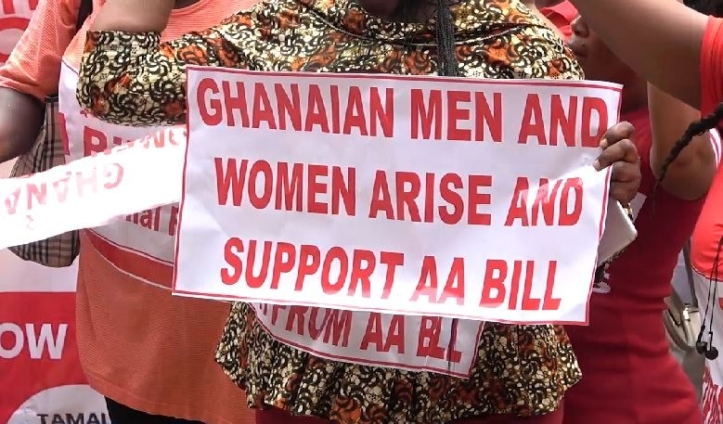The Programs Officer of the Center for Democratic Development (CDD) Ghana, Vera Abena Addo, has emphasised the crucial need for the Affirmative Action Bill in addressing the historical marginalisation of women in decision-making roles.
Speaking on JoyNews’ The Probe, Madam Addo underscored that women, constituting more than half of Ghana's population, have long been excluded from significant decision-making processes.
She highlighted that such exclusion not only hampers development but also undermines the principles of democracy and inclusion.
“The Affirmative Action Bill recognizes the marginalization of women, and for a very long time, women who make up more than half of the population have not been part of decision-making. This undermines our development, democracy, and issues about inclusion participation among others,” she said on Sunday.
She noted that the implications of the bill extend beyond women's issues, pointing to evidence indicating improvements in decision-making outcomes when women are actively involved.
According to her, the country needs to prioritise the inclusion of women in decision-making and leadership roles, not just in politics but also in private and public spheres.
"We must recognise the Affirmative Action Bill is not just a women’s issue but that of a country that we all need to come together to support.
“If you look at Ghana’s population based on the 2021 Census, 51 percent of the population are women, then we need to create that platform and opportunity for more young girls to have an equal playing field to take up positions,” she told host Emefa Apawu.
Highlighting the significance of the Affirmative Action Bill, Madam Addo called on the nation to reevaluate women's participation in politics and decision-making, emphasising the need for a more equitable representation of women in various sectors.
Background
In the early days after Ghana gained its independence, the country legislated an Affirmative Action Act in the middle of 1960 allowing 10 women members to represent the regions of the country in the then legislature.
The law recognised that women’s political participation is a critical component of democratic dialogue and social cohesion.
However, it was lost under the weight of the political upheavals which took place in the intervening years of the country.
The nation has since made various commitments by signing to global declarations and protocols that advocated for increased women’s participation and representation in public life.
Ghana’s Parliament in 2011 re-initiated processes to have the Affirmative Action bill passed into law, but the efforts have suffered setbacks and to date, the bill has failed to pass the basic parliamentary proceedings.
After nearly 60 years following the Affirmative Action move of the 1960s, Ghana has failed to meet the minimum UN recommended threshold of 30 per cent women representation in either the local or the national level decision-making process.
The Bill seeks to encourage efforts towards addressing socio-cultural, political, economic, and educational gender imbalances in private and public sectors in accordance with Clause 4 of Article 17 of the 1992 Constitution.
This is in spite of various calls made by civil society groups, gender advocates and importantly female parliamentarians.
Latest Stories
-
“They went too far” – Elon Musk says he regrets some comments he made about Trump
12 minutes -
BoG’s cumulative loss since 2007 redenomination hits GH¢82.79bn — Eight times its profit
20 minutes -
Today’s front pages: Wednesday, June 11, 2025
48 minutes -
26th TGMAs: King Promise thrills at ‘A Nite with Artiste of the Year’
49 minutes -
‘Algiers Awaits’ – AfCFTA Chief rallies Africa for trade renaissance
1 hour -
Gov’t moves to fast-track industrial growth with light industrial parks
1 hour -
Africa’s trade crisis must end – AfCFTA Chief rallies Ghanaian businesses ahead of IATF 2025
2 hours -
US-China talks end with plan for Trump and Xi to approve
2 hours -
Minority Caucus proposes solutions to deal with energy sector debts
2 hours -
Special Prosecutor calls for asset verification system, opposes public disclosure
2 hours -
We are taking difficult but necessary choices to clean up Akufo-Addo fiscal mess – Felix Kwakye
3 hours -
We can’t honour all past commitments – Gov’t on nurses’ conditions of service demand
3 hours -
Gov’t chose not to budget for nurses’ conditions of service – Kwakye Ofosu defends decision
3 hours -
Nurses’ strike: Gov’t not backtracking, we’re protecting economy from collapse – Kwakye Ofosu
4 hours -
‘Over GH¢2bn cost too high’ – Gov’t defends delay to implement nurses’ deal
4 hours

